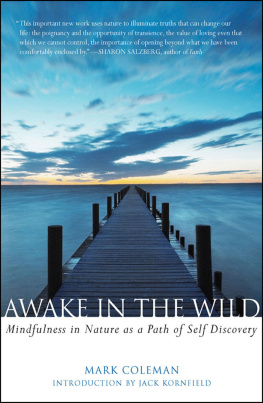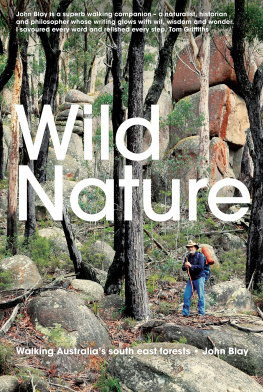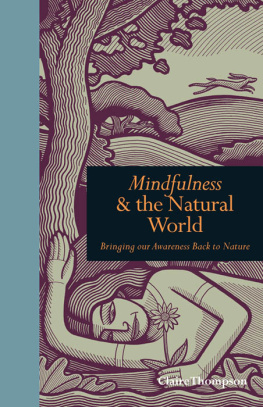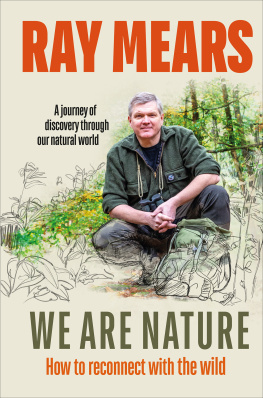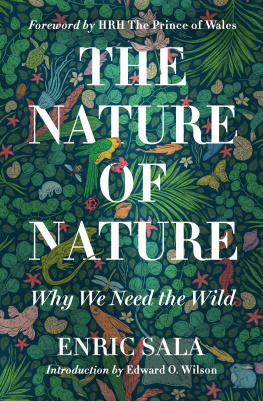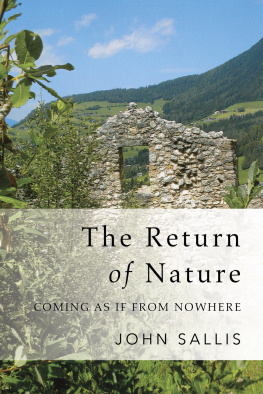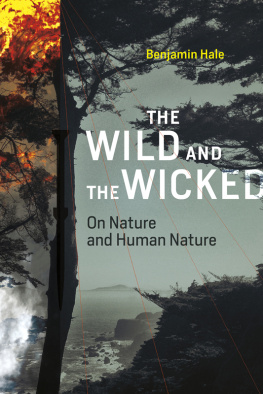AWAKE IN THE WILD
AWAKE IN THE WILD
Mindfulness in Nature as a Path to Self-Discovery
MARK COLEMAN
Inner Ocean Publishing, Inc.
P.O. Box 1239
Makawao, Maui, HI 96768-1239
www.innerocean.com
2006 by Mark Coleman
All rights reserved. No part of this book may be reproduced by any means or in any form whatsoever without written permission from the publisher.
Li Po, Zazen on Ching-ting Mountain, translated by Sam Hamill from Crossing the Yellow River: Three Hundred Poems from the Chinese. Copyright 2000 by Sam Hamill. Reprinted with permission of BOA Editions, Ltd., Rochester, New York
Rumi, The Essential Rumi, translated by Coleman Bark reprinted with permission of translator.
Cover design by Laura Beers
Book design by Madonna Gauding

Inner Ocean Publishing is a member of Green Press Initiative, a nonprofit program dedicated to supporting publishers in their efforts to reduce their use of fiber sourced from endangered forests. We elected to print this title on 50% postconsumer recycled paper with the recycled portion processed chlorine free. As a result, we have saved the following resources: xx trees, xx lbs of solid waste, xx gallons of water, xx lbs of net greenhouse gases, xxx kw hours of electricity (Source: Environmental Defense Paper Calculator). For more information on the Green Press Initiative, visit http://www.greenpressinitiative.org.
PUBLISHER CATALOGING-IN-PUBLICATION DATA
Coleman, Mark.
Awake in the wild : mindfulness in nature as a path to self-discovery
/Mark Coleman. -- Maui : Inner Ocean, 2006.
p. ; cm.
ISBN-13: 978-1-930722-55-2 (pbk.)
ISBN-10: 1-930722-55-9 (pbk.)
1. Nature--Religious aspects--Buddhism. 2. Meditation-
Buddhism. 3. Spiritual life--Buddhism. I. Title.
BQ4570.N3 C65 2006
294.3/377--dc22 0612
Printed in the United States of America
05 06 07 08 09 10 DATA 10 9 8 7 6 5 4 3 2 1
DISTRIBUTED BY PUBLISHERS GROUP WEST
For information on promotions, bulk purchases, premiums, or educational use, please contact: 866.731.2216 or sales@innerocean.com.

To my loving parents, Anne and Roger Coleman To my teachers for helping me awaken to this world, and To the earth herself for the limitless blessings she bestows.
There are many people I wish to thank for helping me bring this book into being. First and foremost, thanks to Karen Bouris at Inner Ocean for her seed of vision in this book and her faith that I could write it, as well as for her gentle nudging along the way. Secondly, thanks for the tireless work of my editor, Angela Watrous, who has been a wonderful ally, support, and guide in the writing process. Special thanks also to Wendy Wank for helping with editing and to Arnie Koetler for starting me off in reenvisioning the book.
I offer deep bows to Sharon Salzburg, whose continued encouragement and faith inspired me to see the vision through, and to Jack Kornfield, who has been such a pillar of inspiration and guidance these past few years. Im also indebted to Christopher Titmuss, who originally pointed me to the unity of Dharma and nature, and to Poonja-ji, who helped reveal my own true nature. Blessings also to Sharda Rogell, who has been such a wonderful steady friend on the Path.
I offer sincere thanks to the many dear friends who have read parts of the manuscript and provided useful reflections, including Kate Wheeler, Kari Fairchild, Anne Coleman, and Tanya Holmes; to Pamela Heisey and Jill and Patrick at IMS for helping with research; and to Catherine Lucas for her patient guidance. Deep appreciation to Heidi Randall, whose love and support helped nourish and enliven my creativity, and to all those who provided fascinating stories of the outdoors.
I feel deep gratitude to Terry Gustafson for originally inviting me to lead wilderness-based retreats, which have been the seed for this work. He has been a true mentor, elder, and friend, and a blessing to many. Thank you to my fellow wilderness guidesKurt Hoelting, Susie Harrington, Betty Jo Black, and Grove Burnettfor all their deep knowledge of the outdoors. I also owe much to each retreat participant Ive worked with over the yearsthank you for your deep and dedicated practice.
Im deeply grateful to all my Dharma teachers, whose words of wisdom perfume the lines of this book, and to my colleagues at Spirit Rock Meditation Center for their teaching and support. Last but not least, I thank my family and friends for providing the nourishment and love that make projects like this possible.
The earth remains my quintessential teacher, refuge, and inspirationto her health and well-being I dedicate the merits and blessings of this book.
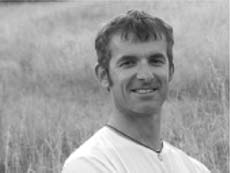
O riginally from northern England, Mark Coleman has been engaged in meditation practice since 1982, primarily within the Insight meditation/Vipassana tradition, with influences of Advaita Vedanta and Dzogchen teachings. Hes led Insight Meditation retreats since 1997, both at Spirit Rock Meditation Center in Northern California, where hes based, and throughout the United States, Europe, and India. Mark is passionate about his work facilitating meditation retreats in nature, which take place in the Sierras, the Southwest, Alaska, Mexico, and beyond. He also teaches contemplative retreats for environmental leaders. Mark has a mindfulness-based counseling practice in the San Francisco Bay Area, where he integrates his studies of psychotherapy and meditative work. He is currently developing a wilderness counseling program and a yearlong training in wilderness meditation work. He can be reached at www.natureretreats.org.
CONTENTS
A wake in the Wild reminds me of lying on my back in the grass on a starry summer night. With a freshness of voice, Mark Coleman invites us back to the big picture, the vast, mysterious neighborhood of being alive on this flowering earth. Cosmologist Brian Swimme explains, Four billion years ago the earth was a flaming ball of rock and now it can sing opera.
Without a big perspective, we are only half awake to our life. Lost in a thousand errands, and our small self, we are not truly free. Then like the sudden glimpse of the full moon, the walls open. Awake in the Wild shows us how to remember this mystery. Its practices derive from the lineage of awakening in nature that I encountered in the ancient forest monasteries of Thailand. There, the words for truth and nature are synonyms. Living in a hut amid teak trees and cobras, jungle vines and wild deer, my Buddhist teachers Ajahn Chah and Ajahn Buddhadasa taught that wisdom and compassion would grow through the mirror of the forest itself.
Wherever we live can be the same. Mark Coleman tells us how to start: Simply take in a tree with all your senses. What a delicious instruction. Let yourself become intimate with a local spruce or redwood, larch or oak. Take in the weathered, textured bark, the subtle shimmer of the leaves. Meander in the wilds of your neighborhood. Then go further, deliberately, out into the wilderness. Open your senses, go barefoot, embrace the wind and hills like a lover. How better to quiet the mind and open the heart?

